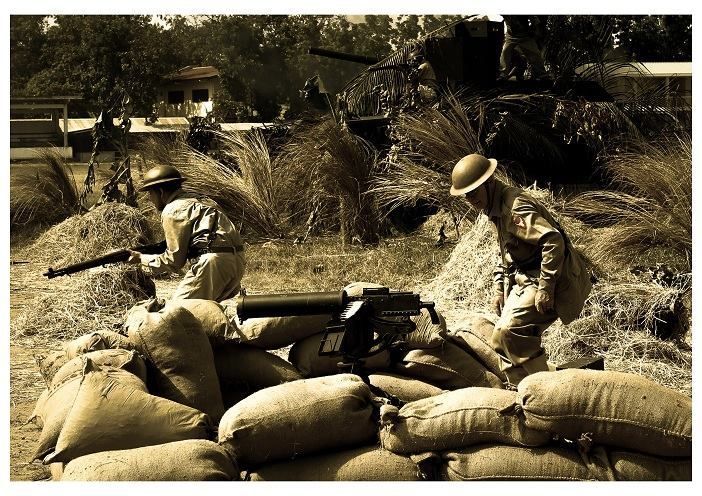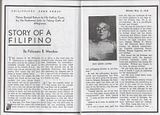Post by flo777 on Apr 7, 2008 0:11:50 GMT -5
Most Filipinos do not know that my great grandfather, Sixto Lopez was very active in the fight for our independence from Spain, US and to a certain degree from the Japanese occupation. Here is a brief biographical excerpt:
Sixto Lopez
April 6, 1863- March 3 1947

Sixto Lopez is the eldest son by Natalio's second wife, Senora Maria Castelo. It was on Sixto whose greater part of his father’s responsibility fell, assuming the passion and aspiration to maintain freedom for his beloved country. Hence, he was considered the natural-born and paternally appointed patriot in the family.

Down-to-earth and calm, yet gifted with an unusual firmness to uphold principles, Sixto, at an early age became closely associated with Dr. Jose Rizal, the Philippine’s national hero. During the Philippine’s uprising against Spanish authority, it was Sixto who privately gave personal and financial aid to Rizal and his works, and who later introduced and circulated Rizal’s books in the Philippines. When Rizal was arrested, he was likewise hunted down for incarceration on the ground that he was “Rizal’s most active agent”. He later on escaped Rizal’s fate only when he accepted voluntary exile from his native land, and soon thereafter, together with Dr. Regidor of London, endeavored to rescue his friend from the hands of his executioners during Rizal’s memorable voyage from Barcelona to Manila. Finally, upon Rizal’s death, it was Sixto who humbly took up the banner as it fell from Rizal’s dying hands as he continued to work unassumingly for the independence of his country, notwithstanding the swift political changes during those times, and in spite of his personal family loss and misfortune.
A photograph of Sixto Lopez and Jose Rizal on Rizal's return from Europe in 1891. This photograph has a special interest owing to the attitude of the Manila authorities toward the dead and the living patriot: while the Members of the Civil Commission were each subscribing to the erection of a monumental statue to Rizal, they were at the same time excluding Lopez from his and Rizal's own native land. It is also interesting because of an incident, which occurred when the photograph was being taken. In response to the customary injunction to "look pleasant," Rizal said to Lopez,” Yes... imagine that you are about to be executed by the Spaniards!" These words were prophetic of Rizal's tragic death, which occurred five years later.
In 1898, Sixto was appointed as Secretary to the Commission of the newborn Philippine Republic under the leadership of Gen. Emilio Aguinaldo. The Commission’s main task was to go to Washington to seek for the recognition of the newly formed nation's independence. He wrote numerous dispatches to Aguinaldo and to the Central Committee at Hong-Kong urging a cessation of hostilities, pointing out that armed resistance could not secure independence, but would only confuse the issues and do injury to a good cause.
When the spate of hostilities between the Philippines and America erupted, this delegation left the U.S. but Sixto soon returned to Boston, Massachusetts in 1900 to be a guest of Fiske Warren, an officer of the New England Anti-Imperialist League. While there, he repeatedly urged the sending of one or more Filipinos to America with the object of informing the American people of the real situation in the country which was being woefully misrepresented by Gen. Elwell Otis and his associates. He then made extensive speaking tours and secured publication of numerous articles in the American press advocating independence. In one of those articles published in the "Independent" of December 14, 1899 and addressed to the American people, he concludes as follows:
"Why not negotiate? If negotiations fail, it will then be time enough for war. True, in the past, our overtures of peace and good will were not received in a hearty manner by the Administration. But let that pass. It cannot be undignified to do what honor and righteousness demand. Who will help me in the cause of peace? Could any cause be worthier the genius of the statesmen of a great nation?
"In placing this statement before the people of America, I beg to assure them that whatever its demerits may be, it is the outcome of a sincere desire for peace and for an honorable settlement of the differences and difficulties of the Philippine question."
His demeanor and utterances while in America have been characterized by moderation, respect, and a sense of welfare. Thus, Sixto was able to establish close ties with many people in Massachusetts and was influential in the Anti-Imperialist League's shift from a nearly exclusive focus on the effects of imperialism on the United States to one, which included a component of solidarity with the Filipino people. Sixto Lopez remained in exile for many years because he refused to take the pledge of allegiance to the United States that was required for his entrance back into his homeland, the Philippines.
The fact that he never pledged allegiance to the US was almost cetainly the reason he was deliberately ommitted from most history textbooks written in the early years of US occupation.
Here is the link of our family website (still under construction):
www.geocities.com/thelopezesofbalayan
Enjoy!
Sixto Lopez
April 6, 1863- March 3 1947

Sixto Lopez is the eldest son by Natalio's second wife, Senora Maria Castelo. It was on Sixto whose greater part of his father’s responsibility fell, assuming the passion and aspiration to maintain freedom for his beloved country. Hence, he was considered the natural-born and paternally appointed patriot in the family.

Down-to-earth and calm, yet gifted with an unusual firmness to uphold principles, Sixto, at an early age became closely associated with Dr. Jose Rizal, the Philippine’s national hero. During the Philippine’s uprising against Spanish authority, it was Sixto who privately gave personal and financial aid to Rizal and his works, and who later introduced and circulated Rizal’s books in the Philippines. When Rizal was arrested, he was likewise hunted down for incarceration on the ground that he was “Rizal’s most active agent”. He later on escaped Rizal’s fate only when he accepted voluntary exile from his native land, and soon thereafter, together with Dr. Regidor of London, endeavored to rescue his friend from the hands of his executioners during Rizal’s memorable voyage from Barcelona to Manila. Finally, upon Rizal’s death, it was Sixto who humbly took up the banner as it fell from Rizal’s dying hands as he continued to work unassumingly for the independence of his country, notwithstanding the swift political changes during those times, and in spite of his personal family loss and misfortune.
A photograph of Sixto Lopez and Jose Rizal on Rizal's return from Europe in 1891. This photograph has a special interest owing to the attitude of the Manila authorities toward the dead and the living patriot: while the Members of the Civil Commission were each subscribing to the erection of a monumental statue to Rizal, they were at the same time excluding Lopez from his and Rizal's own native land. It is also interesting because of an incident, which occurred when the photograph was being taken. In response to the customary injunction to "look pleasant," Rizal said to Lopez,” Yes... imagine that you are about to be executed by the Spaniards!" These words were prophetic of Rizal's tragic death, which occurred five years later.
In 1898, Sixto was appointed as Secretary to the Commission of the newborn Philippine Republic under the leadership of Gen. Emilio Aguinaldo. The Commission’s main task was to go to Washington to seek for the recognition of the newly formed nation's independence. He wrote numerous dispatches to Aguinaldo and to the Central Committee at Hong-Kong urging a cessation of hostilities, pointing out that armed resistance could not secure independence, but would only confuse the issues and do injury to a good cause.
When the spate of hostilities between the Philippines and America erupted, this delegation left the U.S. but Sixto soon returned to Boston, Massachusetts in 1900 to be a guest of Fiske Warren, an officer of the New England Anti-Imperialist League. While there, he repeatedly urged the sending of one or more Filipinos to America with the object of informing the American people of the real situation in the country which was being woefully misrepresented by Gen. Elwell Otis and his associates. He then made extensive speaking tours and secured publication of numerous articles in the American press advocating independence. In one of those articles published in the "Independent" of December 14, 1899 and addressed to the American people, he concludes as follows:
"Why not negotiate? If negotiations fail, it will then be time enough for war. True, in the past, our overtures of peace and good will were not received in a hearty manner by the Administration. But let that pass. It cannot be undignified to do what honor and righteousness demand. Who will help me in the cause of peace? Could any cause be worthier the genius of the statesmen of a great nation?
"In placing this statement before the people of America, I beg to assure them that whatever its demerits may be, it is the outcome of a sincere desire for peace and for an honorable settlement of the differences and difficulties of the Philippine question."
His demeanor and utterances while in America have been characterized by moderation, respect, and a sense of welfare. Thus, Sixto was able to establish close ties with many people in Massachusetts and was influential in the Anti-Imperialist League's shift from a nearly exclusive focus on the effects of imperialism on the United States to one, which included a component of solidarity with the Filipino people. Sixto Lopez remained in exile for many years because he refused to take the pledge of allegiance to the United States that was required for his entrance back into his homeland, the Philippines.
The fact that he never pledged allegiance to the US was almost cetainly the reason he was deliberately ommitted from most history textbooks written in the early years of US occupation.
Here is the link of our family website (still under construction):
www.geocities.com/thelopezesofbalayan
Enjoy!





